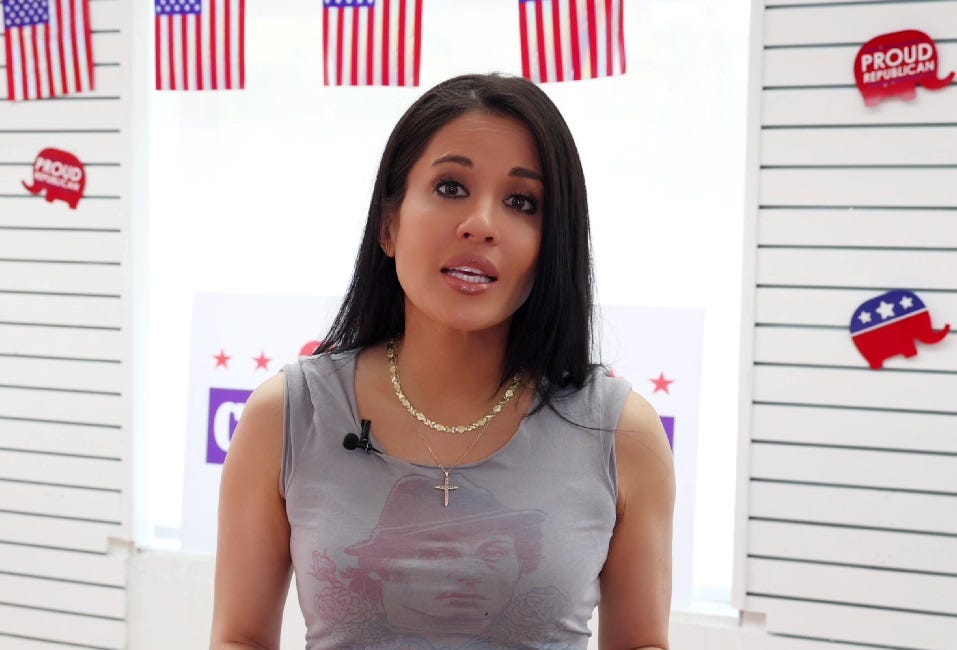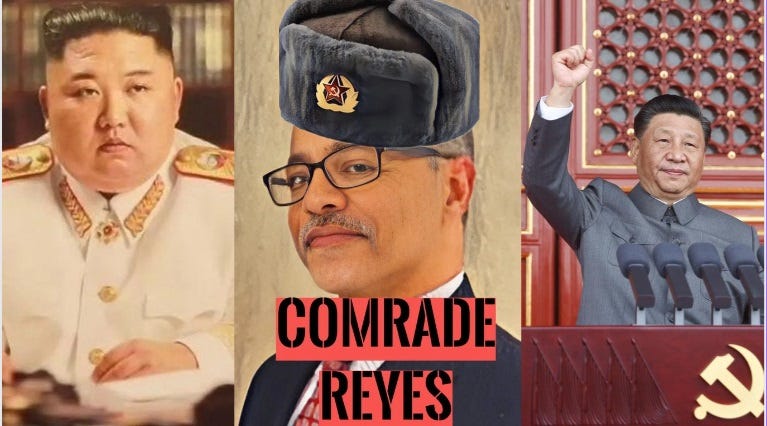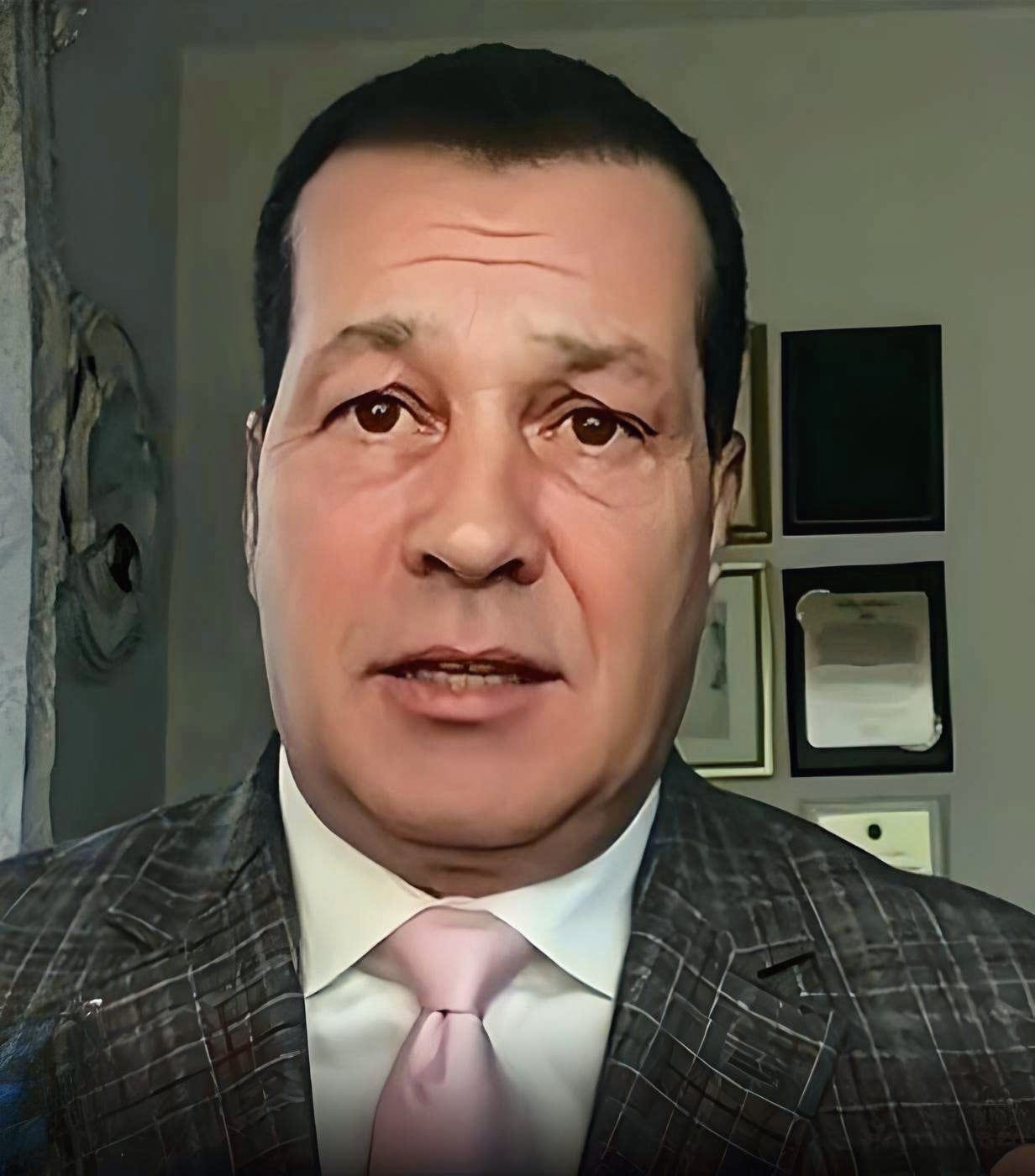Fight for Democracy: Cara Castronuova Appeals For Ballot Access
NY Republican US Senate Candidate Alleges Election Law Violations, Political Manipulation, and Disenfranchisement
By Dick LaFontaine and Richard Luthmann
On May 1, the New York State Board of Elections (BOE) threw candidate Cara Castronuova off the Republican Primary Ballot for the U.S. Senate in New York based on a series of technicalities. On May 10, Albany Judge agreed with the BOE.
Castronuova is not finished. She has taken her fight to the New York State Supreme Court Appellate Division, Second Department. After submitting 15,727 signatures from registered Republican voters to secure her ballot spot, Castronuova challenges New York’s Election Law and the political establishment controlling the BOE and the courts. You can read her Appellate Brief.
Her appeal raises significant constitutional and procedural issues. She asserts that the New York State Election Law is unconstitutional as it denies her and her supporters equal protection, notice, and an opportunity to be heard.
"There is no form of proceeding for relief under the Election Law to validate constitutional rights," she states.
Castronuova also alleges that political conflicts of interest and malfeasance influenced the BOE's actions. She highlights the involvement of BOE employees in filing objections and reviewing the petition, arguing that this constitutes a conflict of interest and undermines the integrity of the process.
Castronuova’s appeal seeks to restore her name to the ballot under the doctrine of functus officio, which states that once an official body has performed its duty, it has no further authority over the matter. She argues that the BOE had no constitutional basis to remove her from the ballot after initially validating her petition.
Some are saying she can win.
The Fight for Ballot Access
Castronuova, a registered voter and enrolled member of the Republican Party, began her campaign for the U.S. Senate earlier this year. Castronuova claims this race differs from other statewide races because of voters’ constitutional guarantees for the federal office election.
“The Seventeenth Amendment is implicated because the election at issue is for a U.S. Senate seat. The textual language guarantees senators of a particular state ‘are elected by the people thereof. Gray v. Sanders,” her papers say, citing a 1963 U.S. Supreme Court case.
For several major statewide offices, the winner of a party's nomination process is automatically included on the ballot. “One of the principal privileges of membership in a recognized political party under the Election Law is a designated ballot line or "berth." Election Law § 7-104(4). For several major statewide offices, the winner of a party's nomination process is automatically included on the ballot,” Castronuova’s papers say.
At the New York State Republican Committee Convention earlier this year, one candidate secured ballot access through this process - by ensuring a single signature from the Party Chairman.
“The Republican nominee, the Respondent, Mr. Sapricone, is the hand-picked choice of NYS Republican Party Chairman Ed Cox, the son-in-law of a former United States President. Mr. Sapricone also enjoys the endorsement of a living former Republican President—a man not named George W. Bush,” Castronuova’s papers say.
The Election Law requires prospective candidates to gather signatures for ballot access if they have not been selected through the party's nominating process. Castronuova needed to collect 15,000 signatures from enrolled Republican voters, with specific numbers from at least 13 congressional districts, during 37 days in March and April. She submitted 15,727 signatures on April 4, 2024, as validated by the BOE.
Ballot Brawl: Cara's Crusade for Justice in NY's Rigged System
By Richard Luthmann
Highlighting deep-seated issues with the New York electoral process, grassroots US Senate candidate Cara Castronuova is battling against what she perceives as a corrupt GOP establishment. This conflict has escalated into a legal fray as Castronuova strives to secure her position on the June 25 Republican Primary ballot.
However, objections soon followed. Anthony Nunziato, Chairman of the Queens County Republican Party, and Carl C. Aliviado, a BOE employee, filed general objections received by the BOE on April 9, 2024. Specific objections were filed on April 15, 2024, claiming 2,650 signatures were invalid for various reasons, including incorrect registration and enrollment statuses, missing or incorrect addresses, and improper dates.
Castronuova claims the entire New York Election Law system of objections and invalidation petitions is unconstitutional in her U.S. Senate election because it effectively ignores her petition signers’ voting rights, including the heightened guarantees for the direct popular election of Senators applicable to party primaries.
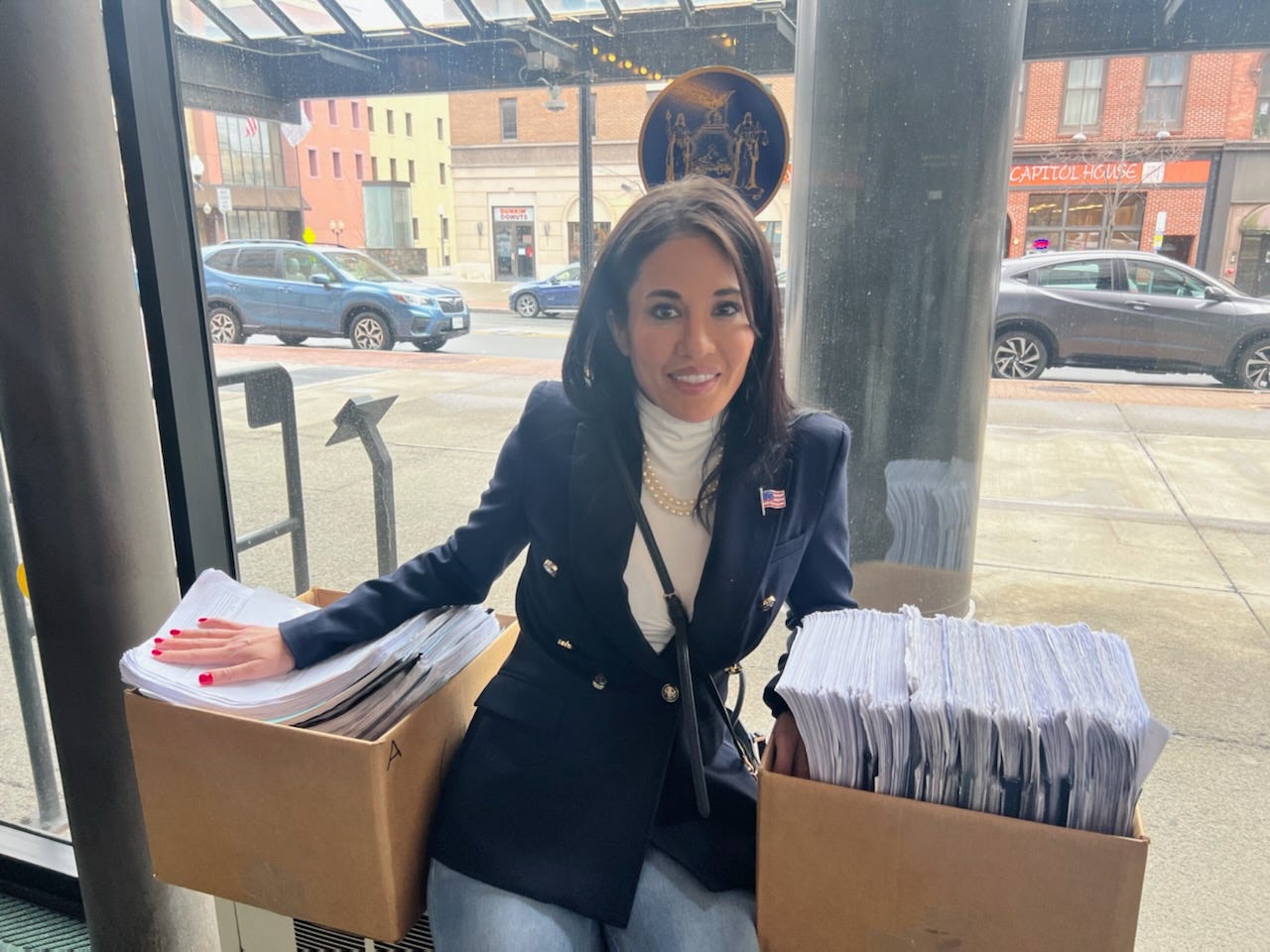
“The textual and historical circumstances surrounding the Seventeenth Amendment were fueled by various societal and political factors that underscored the inefficiencies and ethical concerns associated with legislative selection. Concerns over the influence of party bosses, political machines, and corruption…highlighted the need for a more transparent and democratic selection process. Efforts at the state level to circumvent legislative selection through primaries and other methods indicated a growing demand for change, reflecting broader societal shifts towards more excellent democratic governance. See Tashjian v. Republican Party of Conn.,” Castronuova’s papers say.
Castronuova calls this case a “litmus test.”
“Ballot access for the Respondent, Mr. Sapriacone, and the simultaneous denial of ballot access for Castronuova is the product of party bosses and “King-Makers.” If former Presidents and their relatives are allowed to act as “King-Makers” and violate the constitutional rights of rank-and-file party members with impunity, we have proof positive of a broken Election Law system and a corrupt judiciary that sanctions the selective application of the Rule of Law,” her papers say.
Legal Battles Begin
Last month, Anthony P. Nunziato and Carl C. Aliviado instituted an objector lawsuit in the Albany County Supreme Court, seeking to have Castronuova tossed from the ballot. Mr. Sapricone joined them. All three are represented by Attorney James Curran, a lawyer and registered lobbyist for the Albany-based Brown & Weinraub, where he has worked for over five years. Before that, he was counsel to the NYS Senate Democratic majority in various roles.
The first hearing court hearing was held on April 22, 2024, where Castronuova, representing herself, argued that her petition had enough valid signatures and that the objections were untimely and forged. She requested a cross-claim against BOE, which Supreme Court Justice Justin Corcoran denied as “late.” The Court found Nunziato and Aliviado’s objections to be filed in a timely manner, denying Castronuova's defense based on timeliness on April 29, 2024.
Further proceedings were scheduled, anticipating Castronuova's filing of a validation proceeding after the BOE meeting on May 1, 2024, which she had already termed “politically influenced” and a product of a “conflict of interest.”
She explicitly names Anthony P. Nunziato and Carl C. Aliviado as having conflicts of interest. Aliviado is an employee of the BOE and an appointee of the Queens Republican Party, and Nunziato is the Chairman of the Queens Republican Party. Alivado reports to Bart Haggerty, a member of the Queens GOP Executive Committee. These connections undermine the integrity of the process.
In April, Castronuova called the BOE, and the call confirmed that Aliviado, the objector to her designating petitions, was “doing petitions.” Aliviado’s voicemail confirms he is a BOE employee.
Castronuova alleges outrageous conflicts of interest and political influence in the BOE’s actions. She points out that BOE employees involved in filing objections and reviewing her petition were connected to the political establishment, raising questions about the fairness and impartiality of the process.
She argues that these connections and the undisclosed political motivations create an appearance of impropriety and undermine the integrity of the process in its entirety, both at the BOE and subsequently at the Supreme Court, where Justice Cocoran relied upon the presumption of regularity of the Board’s records.
“It’s clearly ‘Rules for thee, but not for me,"‘ said a veteran political consultant who was present at the BOE on April 29 for the Executive Director’s findings.
“How can they disqualify something as the ‘Wrong Town’ or ‘Wrong Address’ when the BOE uses that address to deliver their mail, and the US Postal Service gets it right daily?… The Party Bosses write these BOE Rules to keep grassroots candidates from running against their select and chosen politicians, people whom the establishment can count on to look the other way when needed,” the consultant said.
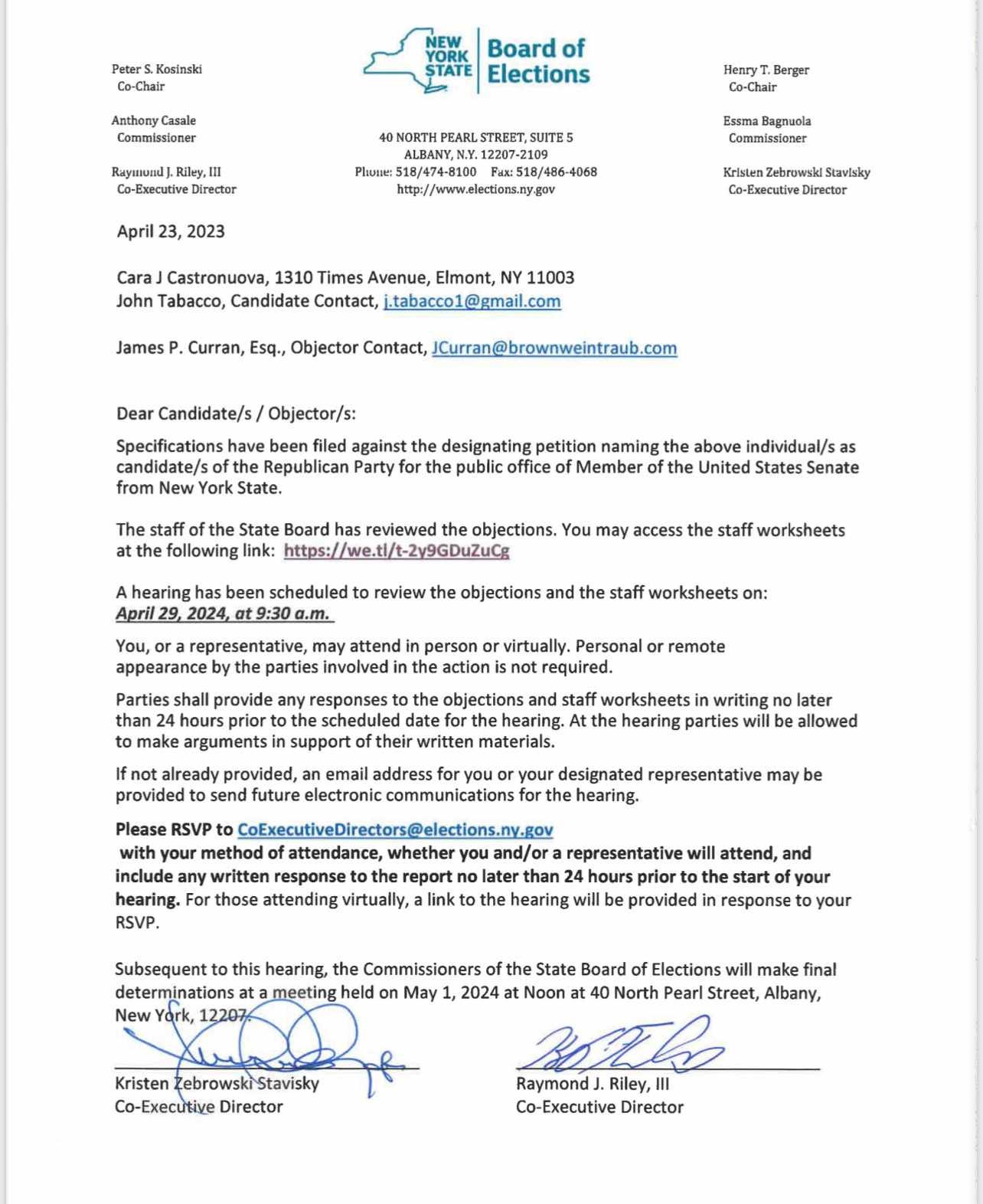
The consultant pointed to a “Smoking Gun” letter from the BOE announcing the meeting with the Executive Directors. Castronuova’s papers also did, blaming BOE malfeasance leading to constitutional violations.
“BOE employees were also objectors and judges of the Castronuova line by line. The BOE has fundamentally violated candidate Cara Castronuova and her supporters' First Amendment, voting, and equal protection rights. The letter purportedly transmitted on ‘April 23, 2023’ is legally invalid for notice purposes for the hearing. The transmission is prima facie invalid, inconsistent with BOE rules, and legally defective (see Matter of Feliciano v Guastella)...Even if the error was ministerial, equal protection demands equal treatment, which has not been provided regarding the Designating Petition,” Castronuova’s papers say.
Castronuova says the BOE did only one thing right—they accepted her designating petition and the signatures of 15,727 registered Republican voters. After that, the party apparatchiks took over, and the “establishment” tore up the constitution.
“Castronuova and her supporters were denied proper notice and an opportunity to be heard. Therefore, the entire hearing and any actions taken by the NYSBOE afterward are legal nullities concerning the Designating Petition (see 22 NYCRR 6204.1). The discrepancies in the notice do not override the electorate's right to exercise their franchise fully (see Matter of Staber v Fidler, Matter of Flacks v Bd. of Elections in the City of NY),” the papers say.
The BOE oversees ballot access and the conduct of elections in every local board within the state. Despite claims of “independence” by the state and local branches, the BOE functions as a single entity. The BOE controls the funding and oversight, as evidenced by their budget requests and actions during the investigation of wrongdoing, such as the 2016 voter roll purge incident involving former Kings County Chief Board of Elections Clerk Diane Haslett-Rudiano.
BOE staff, including Alivado, have reviewed Designating Petitions in Queens, which is creating a significant conflict of interest. This non-disclosure impairs the perceived integrity of the objections to Castronuova's candidacy, failing to uphold the BOE's stated standard for impartial and fair conduct in election oversight. Undisclosed conflicts of interest and manipulation compromise public trust in democratic systems, as highlighted by the New York State Court of Appeals (Grillo v Harrington; McGuire v Gamache).
Unsurprisingly, the bent BOE booted Castronuova from the ballot on May 1.
Validation Proceedings

On May 3, 2024, Castronuova filed a special proceeding to validate her petition as an aggrieved candidate. A hearing on May 7 and 8, 2024, consolidated the invalidation and validation proceedings.
At the hearing, it was agreed that 15,000 valid signatures were required. Castronuova submitted 15,727 signatures, and the BOE invalidated 2,029, leaving 13,698 valid signatures. Castronuova says she has a legal roadmap to the 15,000 necessary signatures.
“A cumulative total of 1,582 challenges were disallowed purely based on legal error. The petition faced 305 challenges for wrong addresses, 12 for signing witness addresses, 450 for wrong towns, 63 for alterations, 49 for signing witness alterations, 230 for incomplete dates, 364 for not being enrolled or registered, and 109 for signing witness issues. The Supreme Court conceded that Castronuova has 14,008 valid signatures, even with the legally defective disallowed classes stated above,” Castronuova’s papers say.
The Supreme Court reviewed Castronuova's applications to dismiss the original invalidation petition and declare the BOE's actions unauthorized. The Supreme Court ultimately denied Castronuova all relief requested and ordered her removed from the June 25, 2024, Republican Party primary ballot. As it stands, there will be no Republican primary, as Mr. Sapriacone is unopposed. In a recent controversial ruling, EDNY Federal Court Judge Ramon E. Reyes misunderstood this nuance of the Election Law.
EDNY Judge Ramon E. Reyes' Ruling Under Fire: U.S. Senate Election Ruling Draws Parallels to Dictatorships
By Richard A. Luthmann
In a Decision and Order fraught with controversy, Judge Ramon E. Reyes, Jr. of the Eastern District of New York has denied Cara Castronuova a spot on the Republican Primary ballot for the office of U.S. Senator, sparking allegations that the New York electoral system mirrors those of North Korea and China.
Castronuova claims the Supreme Court made serious legal errors and relied upon false, dishonest, and unreliable statements presented by the BOE. Citing and distinguishing legal precedent, Castronuova believes that if the law is correctly applied and her petition-signers’ rights are respected, she will be restored to the ballot. She argues that only a de novo review can remedy the constitutional harm to her 15,727 supporters.
One of the significant legal issues concerns wrong addresses and the “Town/City Trap.” Castronuova says that if the law is applied correctly, that single determination restores over 750 voter signatures.
“The Board of Elections wrongly invalidated signatures where the signer either failed to include or included an incorrect county, town, or city. This contradicts the ruling in Molinari v. Powers, where the Federal District Court held that Election Law § 6–132 was unconstitutional for requiring a signer of a primary petition to list towns. Additionally, signers, in this case, listed their post office addresses, the same addresses used by the BOE for mailing purposes, and should not have been invalidated, as established by Giordano v. Westchester Cnty. Bd. of Elections,” Castronuova’s papers said.
The Candidate also says that the cases often used to ignore Molinari are not applicable here.
“Stoppenbach v. Sweeney involved a congressional race, not a statewide one. Prestia v. O’Connor is also not applicable as it dealt with an internal Conservative Party dispute, which the Second Circuit ruled should be resolved in state courts,” the filed papers say.
Ultimately, Justice Cochran disagreed, and Castronuova filed her Appellate Brief on Friday morning. But even that seemingly mundane task wasn’t without controversy.
Potential Filing Fiasco Averted
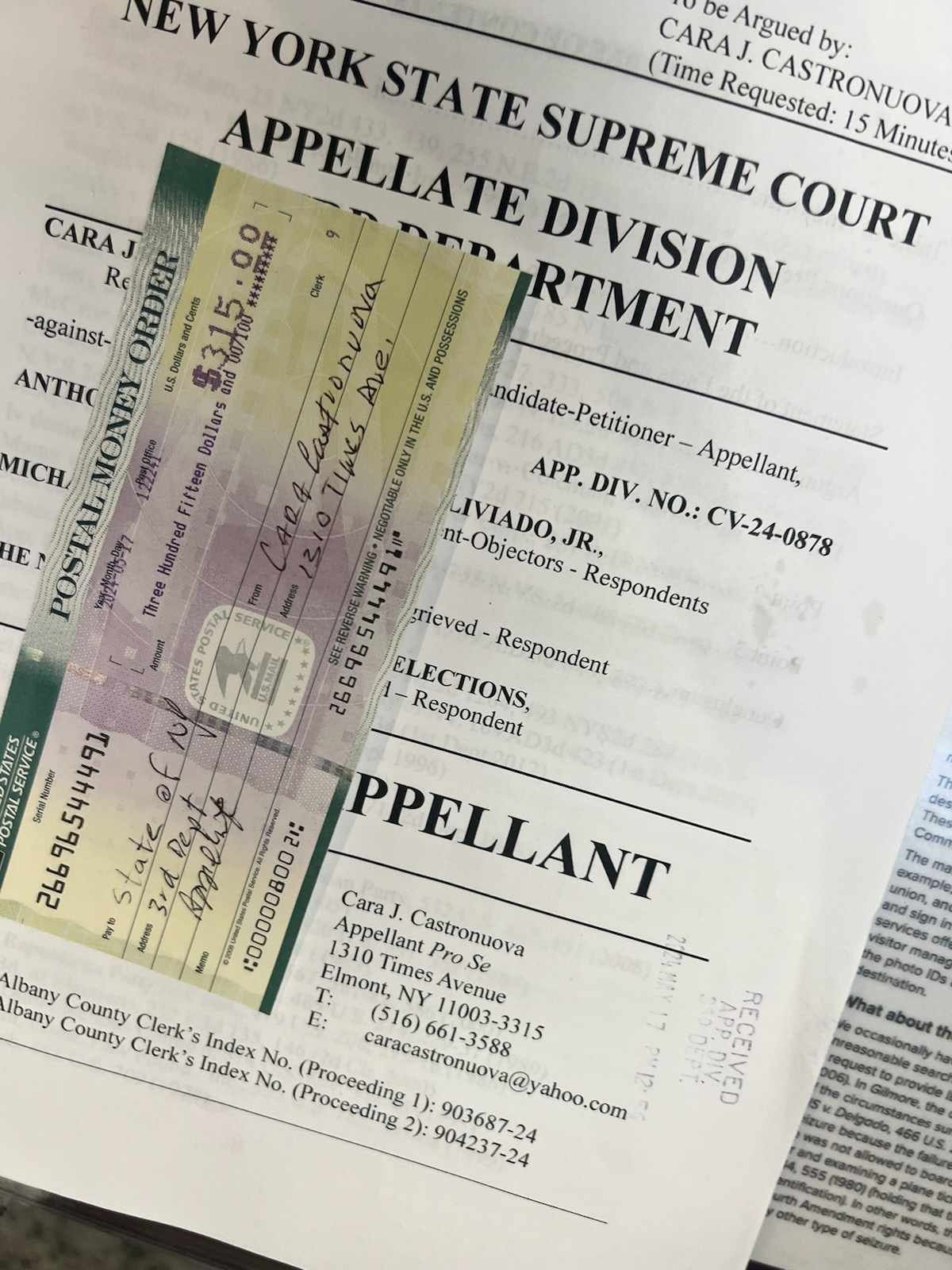
John Tabacco is a Castronuova supporter and co-plaintiff in the companion EDNY matter, Castronuova v. Cox. He physically handed the Castronuova Appeal into the Appellate Division counter on State Street in Albany last Friday.
“I know they were giving Cara all sorts of technical problems in the courts. She’s a Pro Se party and a grassroots candidate. This Election Appeal raises serious voter disenfranchisement, BOE misconduct, and structural problems within the Election Law. It doesn’t take a lawyer to see that they are trying to use every sleazy trick in the book to deny Cara her opportunity to be heard. That’s their game. The BOE and the Albany Judge already disregarded the rights of 15,727 Republican Party voters for a U.S. Senate race in favor of the “Kingmaker” Party Boss selection. Unlike her Letita James-supporting Republican opponent, Cara Castronuova does not seek to be coronated. She wants to earn it just like her numerous personal and professional accolades,” Tabacco said.
Tabacco wasn't prepared for what he would encounter at the Albany Appellate Division Office.
“The Assistant Clerk basically told Cara over the phone that if all of the briefs and materials were not there by noon on Friday, she wouldn’t accept them. So we busted our ass, and I hand-delivered everything. The Clerk physically accepted everything well before noon,” Tabacco said.
He thought he was in the clear until he looked down at the stamped copy from the Clerk’s Office.
“It said RECEIVED: APP DIV 3RD DEPT. The time stamp was 2024, MAY 17 PM 12:56,” Tabacco said. “The machines there were an hour off.”
Recognizing that they were looking for any reason to knock Cara out, Tabacco got some help.
“We worked too hard to give it to Ed Cox and his well-paid Democrat lawyers and lobbyists. I’m the son of an NYPD Detective, so I turned to the blue for help.”
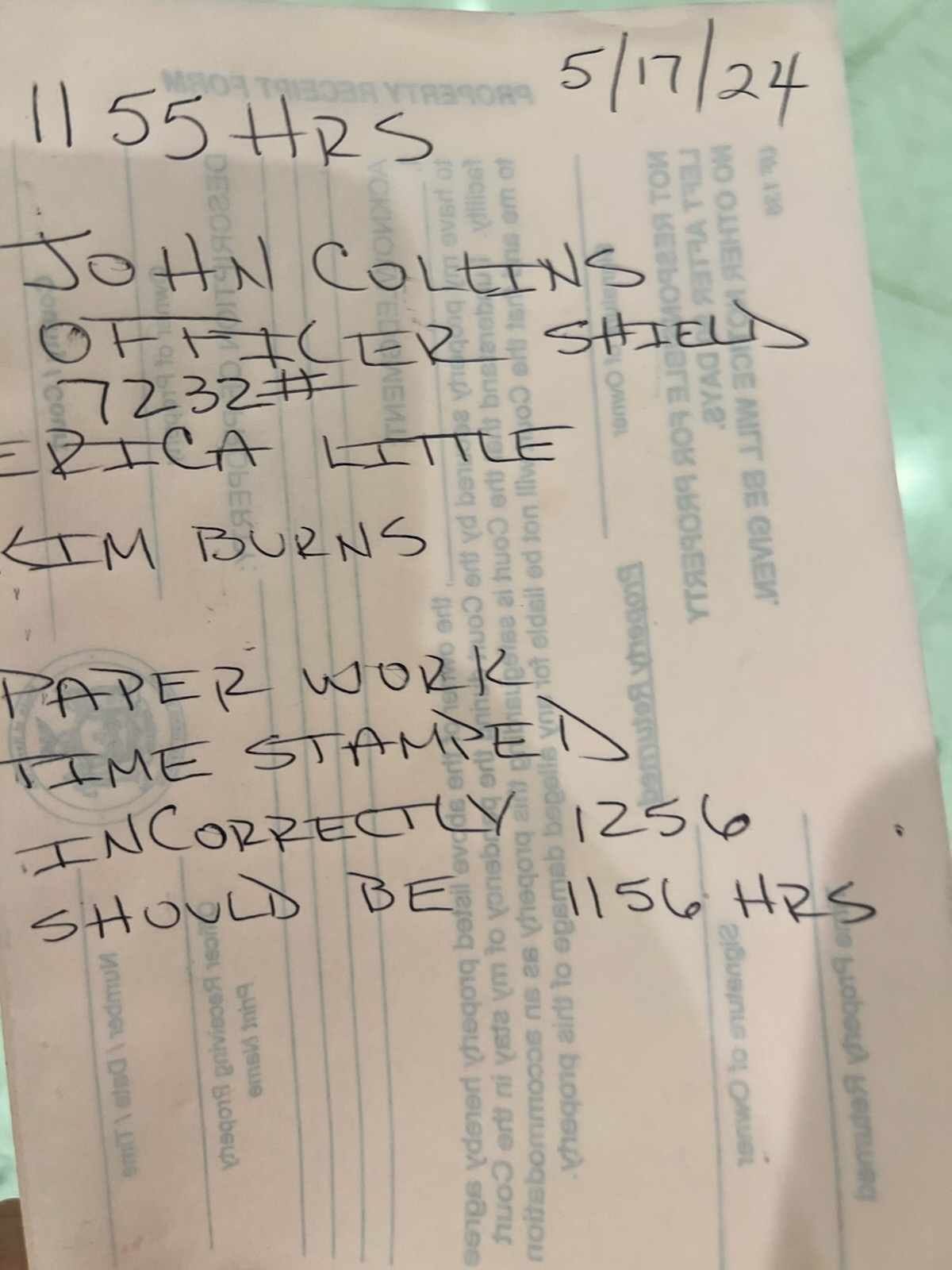
Tabacco found an Albany Police Officer, John Collins, to verify that the time stamp on the document received from the Appellate Division Clerk was incorrect.
“We’re covered on this issue. But you know they are probably sitting around looking for technicalities right now. However, I am informed by my legal scholars that it would be challenging for a case involving constitutional rights, in this case voting rights, to be dismissed without the Court hearing the merits,” Tabacco said.
The “Modern Day Guy Molinari” is correct, and he pointed to cases like Fuentes v. Shevin and Mathews v. Eldridge.
“I have been considering due process, given my own injuries as a disenfranchised Castronuova voter. Everything I have read and discussed with experts shows that administrative and technical deficiencies or processes cannot swallow up constitutional rights.

A source with knowledge of the litigation said that the Respondents will seek to have Castronuova’s appeal dismissed on the basis of a defective record. On Friday, Castronuova, Attorney Curran, and Attorney Quail for the BOE exchanged emails about that issue. When asked, Castronuova’s camp was quick to respond.
“Aside from Transcripts, delayed by an Albany murder trial that the Court Reporter said he could not produce for three weeks, Cara put together a comprehensive record. A campaign source said that all of the issues are legal, and the Appellate Divison can rule on the Supreme Court’s Order, which speaks for itself,” a campaign source said.
We spoke to another source knowledgeable about Election Law matters and the parties who confirmed the strategy.
“There are certain trivial issues and others that are not,” the source said. “Voting is central to democracy and our system of government. It is a fundamental right repeatedly textually committed to our foundational documents. I don’t think this is the hill [Attorney Curran] wants to die on, but he would be remiss if he didn’t raise defects that could help his client’s case.”

We attempted to reach Attorney James Curran of Brown & Weintraub for comment. As of press time, he had not responded to this inquiry:
From: Dick LaFontaine, Investigative Journalist <RALafontaine@protonmail.com>
Date: On Friday, May 17th, 2024 at 4:34 PM
Subject: Castronuova Appeal
To: James Curran <jcurran@BrownWeinraub.com>Attorney Curran,
We are running an article about the Castronuova appeal.
A source close to the Castronuova campaign claims that your clients seek to reject claims that Republican Party voters were disenfranchised because the Albany Supreme Court reporters haven't completed the transcripts from the proceeding before Judge Corcoran, in part due to a murder trial.
Is it your client's position that voter disenfranchisement is trivial?
The source said your clients would require a transcript before they could make a legal determination about whether slavery was wrong.
Do you have any response?
Regards,
Dick LaFontaine
Investigative Journalist
“It’s going to be bad optics if [Cox and Sapricone] don’t try to take this case head-on,” said a well-known Manhattan Democratic consultant.
“The chatter is that this could be transformative. Most BOE jobs are for party loyalists and family members who form the backbone of petition-gathering and GOTV (get out the vote) operations. They are also party officials engaged in activity on behalf of the party. An adverse ruling could destroy much of the party patronage,” the consultant said.
A well-known Election Law attorney, speaking anonymously, was much more blunt.
“These aren’t civil service jobs. There are no qualifications or tests. Imagine if BOE employees were required to be fair and ethical. The current system would face seismic ripples. I can’t even begin to think about what that system would look like,” the source said with a laugh.
Implications for Election Law
This case has broader implications for New York's Election Law and the rights of candidates and voters. Castronuova argues that the current system allows party leaders to act as “King-Makers,” selectively applying the rule of law to favor their chosen candidates. "Ballot access for the Respondent, Mr. Sapricone, and the simultaneous denial of ballot access for Castronuova is the product of party bosses and 'King-Makers.'"
Castronuova invokes both the U.S. and New York State Constitutions in her argument. She cites the Seventeenth Amendment, which ensures that U.S. Senators are elected by the people, not selected by party bosses.
“The textual language guarantees senators of a particular state ‘are elected by the people thereof,’” she argues.
She also references the First Amendment, which protects citizens' rights to associate and form political parties.
"The First Amendment protects the right of citizens to associate and to form political parties for the advancement of common political goals and ideas," she quotes from Timmons v. Twin Cities Area New Party.
Castronova highlights a defect in the Election Law § 16-102, where it only allows two types of proceedings: invalidating a candidacy and validating a candidacy. An aggrieved candidate, a party committee chairman, or someone who filed objections can file a petition to invalidate a candidacy. But only the candidate can bring a proceeding to validate a candidacy.
Castronuova’s 15,727 supporters cannot validate her candidacy for the U.S. Senate under this law. They lack the legal standing to bring a suit under Article 16 of the Election Law. They also cannot write in her name at the Republican Party Primary because New York Election Law prohibits primaries in uncontested elections. As she states in her papers, Castronuova believes that the Legislature always intended that when a candidate must bring an Election Law petition in a defensive posture, the constitutional rights of the candidate are defended and represented by the candidate.
A ballot access candidate defending an Article 16 Election Law challenge to invalidate their designating petition represents not just their candidacy but also their supporters' voting and associational rights. In this context, Castronuova stands in defense of the constitutional rights of over 15,727 New York voters in addition to her own ballot access. These voters expressed their rights through their signatures on the Designating Petition, and only the candidate has the standing to defend these rights under Article 16 of the Election Law as it was interpreted by the Supreme Court.
That can’t be right. How can a voter LOSE RIGHTS by signing a designating petition? The unique procedural posture under Election Law raises the issue of whether the Court's reasoning if it deems the Counterclaim and Crossclaim jurisdictionally invalid due to a strict statute of limitations, leaving no remedy for aggrieved New York voters. This should render this portion of the Election Law unconstitutional as applied to defensive candidate claims. The question arises as to which constitutional provision protects voters' rights under an invalidator petition under Article 16 of the Election Law and where John Tabacco, a designating petition signer and Castronuova’s co-Plaintiff in a related Federal Court lawsuit, can seek remedy for a violation of his constitutional rights under New York Election Law. The short answer is – he can’t. He has no standing to seek remedy for the violation of his rights in the New York Courts.
This Court should unequivocally state that Designating Petition signers' constitutional voting and association rights are implicated in the Article 16 Election Law proceeding where a candidate defends against an invalidation petition. Even if the Court does not believe these concerns rise to the level of the US and New York Constitutions, the principle remains that where there is a right, there is a remedy. The CPLR and the Election Law should be read together to maintain fairness and integrity in the electoral process, as established in Jones v. Gallo, 37 AD2d 793 (4th Dept. 1971).
When a candidate defends against an invalidation challenge, it becomes a third class of validator claims, responding directly to an invalidator by an opposing candidate or their supporters.
Request for Relief
Castronuova concludes her appeal by requesting the Appellate Division to reverse the Supreme Court’s decision and restore her name to the ballot. She argues that only this relief can remedy the constitutional harm done to her and her 15,727 supporters.
For the foregoing reasons, it is respectfully submitted that the Order entered by the Court below must be reversed and a new de novo Order should be issued pursuant to Sections 16-100, 16-102, and 16-116 of the Election Law, declaring valid the Designating Petition which named the Petitioner as a Candidate of the Republican Party for the Public Office of Member, United States Senate, Statewide State of New York at the Republican Primary Election to be held on June 25, 2024, and to Order said Respondent Board of Elections to place the name of said Candidate upon the official ballots of such Primary Election.
Castronuova awaits Opposition from the Respondents due Monday. The Appellate Division has set Oral Arguments for 2:00 p.m. on Wednesday.
"This case is a litmus test for the integrity of our electoral process and the protection of voters' constitutional rights," Castronuova emphasizes.
The outcome of this case could have widespread ramifications, particularly for the BOE, in addition to ballot access for Cara Castronuova.







